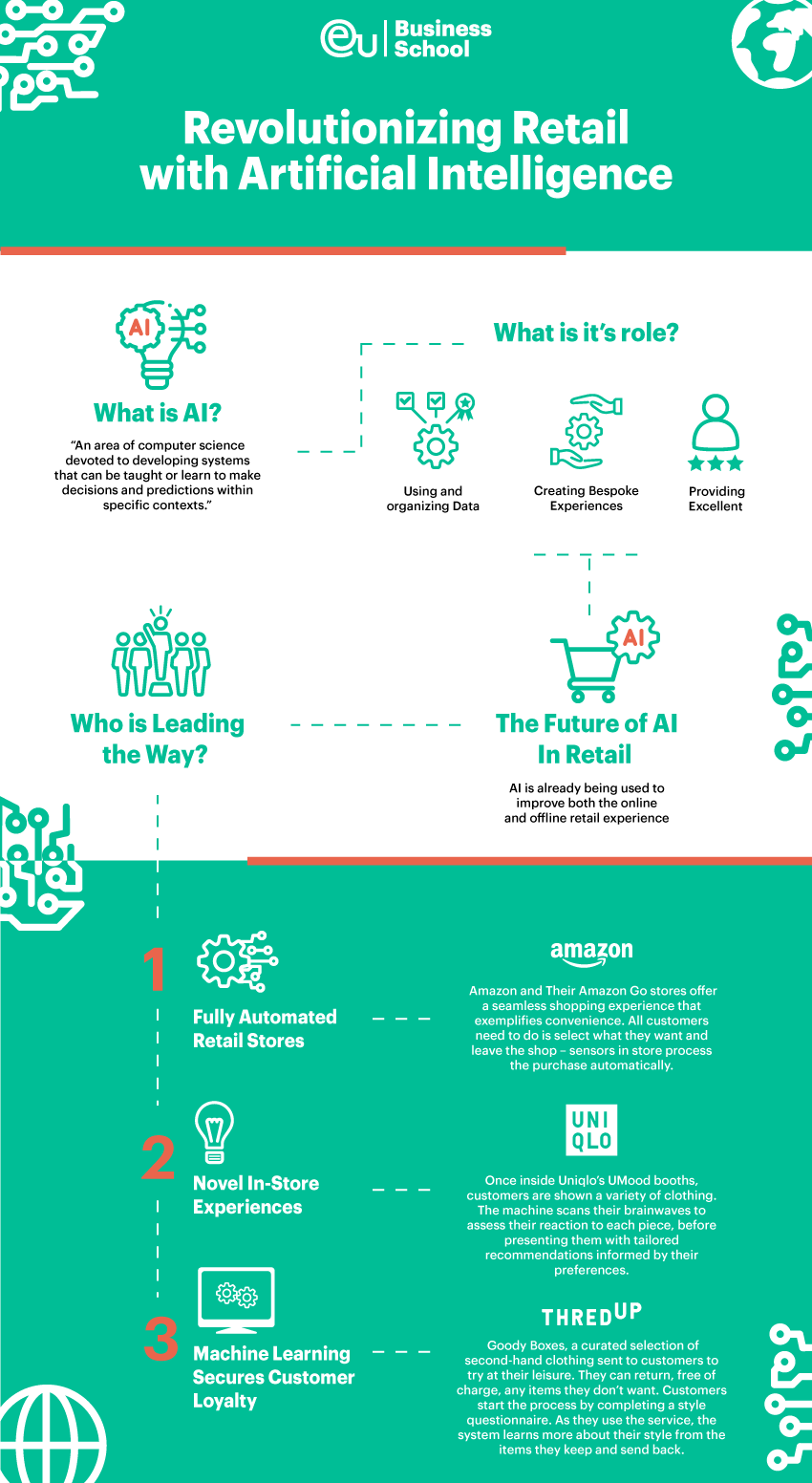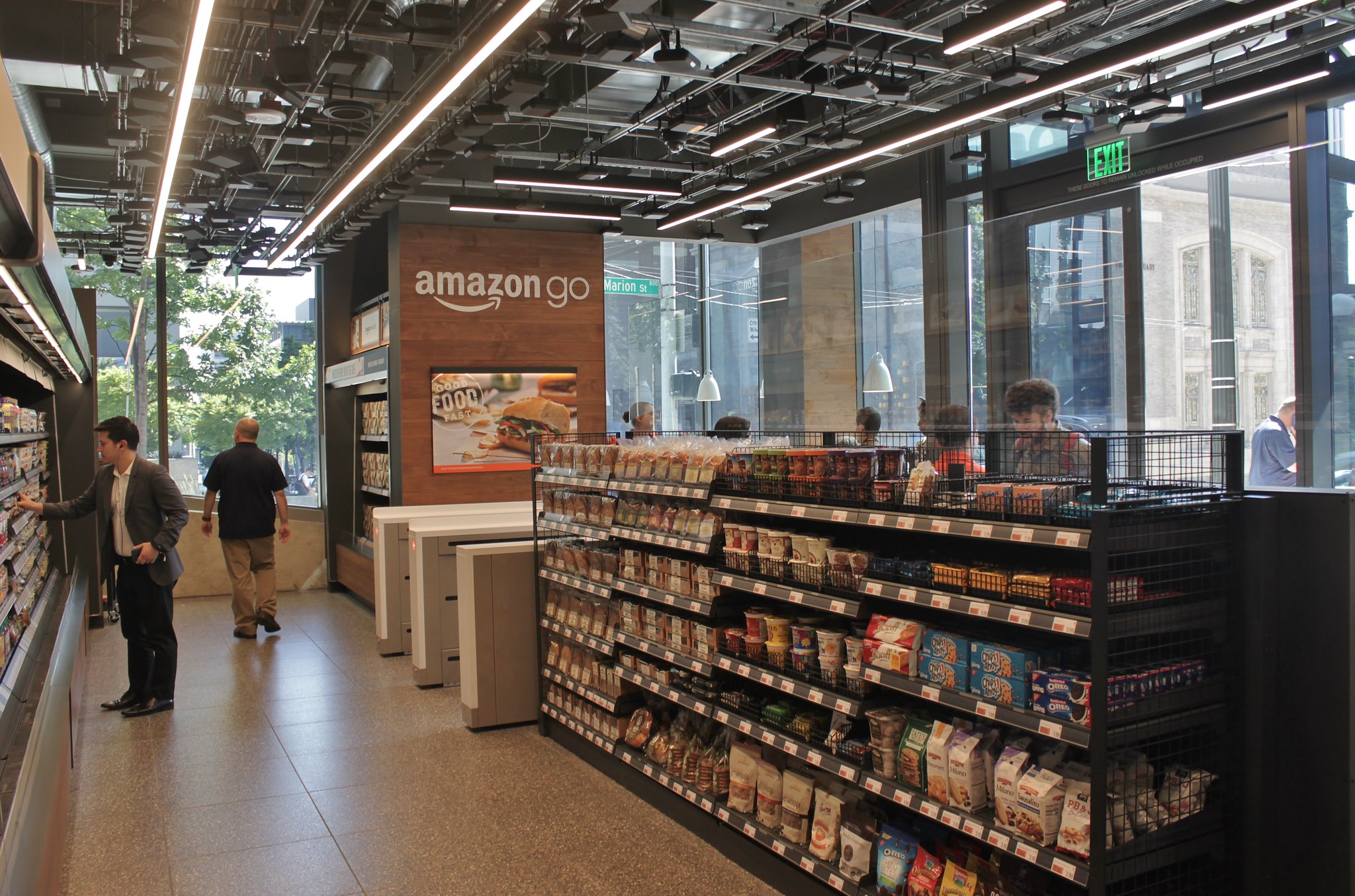Artificial Intelligence (AI) boosts productivity, saves time and increases efficiency when applied across industry. In retail, the story is no different.
The recent health crisis has accelerated trends in retail, causing brands to build or rapidly expand and improve their e-commerce model. While customers are now able to return to the shops, online shopping has become habit for many and the trend is expected to stick. In order to maintain profitability, retailers need to consider how they differentiate between their in-store and online offering. Using cutting-edge technology will help businesses embrace this change successfully.
Here, we explore how AI can be applied in retail and look at some examples of businesses already taking advantage of this technology to get ahead.


What is Artificial Intelligence (AI)?
AI has been described as, “An area of computer science devoted to developing systems that can be taught or learn to make decisions and predictions within specific contexts.”
AI incorporates machine learning and algorithms, both of which can be applied to retail.
The Role of Artificial Intelligence in Retail
AI is already being used by savvy retailers to improve productivity and profitability. Here are some of the ways AI technology can be applied in retail.
1. Using and Organizing Data
One of the primary uses of artificial intelligence is organizing and making sense of the vast quantities of data that businesses generate and process every day. Data configuration is a time-intensive task that does not require human intelligence. AI can be used to manage product data, align information from several different sources (or suppliers), re-format it for uniformity in a centralized system and automatically generate accurate SEO enhanced product tags and descriptions.
Aside from limiting human fatigue, using AI in this way ensures a level of consistency and accuracy that will enable retailers to manage stock better, forecast sales and order or produce products accordingly. It also increases product searchability, thus improving sales outcomes.
Ultimately, this benefits the business’ bottom line as well as having a positive impact on sustainability by limiting waste.
2. Creating Bespoke Experiences
Increasingly, consumers expect personalized experiences. AI enables businesses to offer intelligent recommendations and personalized search results to enhance the customer experience. Machine learning feeds algorithms with data, enabling them to build models that can make informed predictions. In retail, this is what enables Amazon to make accurate recommendations “just for you”.
Similarly, machine learning can be used to improve search results based on customer preferences. For example, if you search a platform with thousands of products for “Tupperware jug red”, intelligent search results would use data from your previous searches to determine whether the most relevant results would be Tupperware branded items, or varieties of red plastic jugs.
In both instances, as the algorithm receives more data, outcomes improve and sales conversions increase.
3. Providing Excellent Customer Service
One of the most prolific uses of AI across industry is in customer service. Bots enable businesses to provide immediately responsive and very cheap customer support, 24/7. Bots are programmed to ensure interactions maintain a recognizable brand personality, much in the same way that customer service personnel are often given a script during training.
This technology is used to varying degrees across retail. Yet, without human backup, it can prove glitchy. Perhaps the most effective use of AI in customer support at the moment is in triaging customer questions and complaints to make sure they receive speedy and effective attention.
The Future of AI in Retail
The rapid rise of e-commerce has drawn a sharper line between consumer expectations of online and brick-and-mortar shopping experiences.
E-commerce offers a convenient, efficient and safe way of shopping; advantages which have now been recognized by even the most reluctant online shoppers. This has accelerated what’s been referred to as the decline of the high street in the UK; visiting the shops does not hold its former appeal.
Having a store presence is no longer revenue-generating. Instead, retailers need to use shop space to provide memorable and meaningful experiences to shoppers that bring the brand to life and build customer loyalty.
What’s more, increasing distrust, misinformation and overwhelming choice are fueling a desire for increasingly personalized experiences.
AI is already being used to improve both the online and offline retail experience. Looking ahead, there’s no shortage of innovative ways to use artificial intelligence to enhance retail businesses. All that’s needed is imagination and an informed understanding of the sector.
Three Retailers Leading the Way with AI
Aside from the increasingly familiar uses of AI we’ve already explained, there are some exciting innovations in play that give a glimpse of what the future of retail could look like. Here are three examples of businesses using AI with imagination.
1. Fully Automated Retail Stores
Unsurprisingly, Amazon is one of the companies leading the way when it comes to using artificial intelligence. Their Amazon Go stores offer a seamless shopping experience that exemplifies convenience. All customers need to do is select what they want and leave the shop – sensors in store process the purchase automatically.
Post-coronavirus retail is likely to be shaped by heightened health and safety concerns. This contact-free shopping experience is perfectly positioned to capitalize on that trend.


2. Novel In-Store Experiences
One way to drive footfall to physical stores in an e-commerce dominated retail landscape is by providing a novel experience that customers are eager to try and share.
Once inside Uniqlo’s UMood booths, customers are shown a variety of clothing. The machine scans their brainwaves to assess their reaction to each piece, before presenting them with tailored recommendations informed by their preferences. The entire experience is automatic; customers don’t have to say a word.
According to Shopify, almost half of American shoppers say they have spent more than originally planned because their experience was personalized. This memorable experience is an innovative way to enhance brand perception while increasing sales.
3. Machine Learning Secures Customer Loyalty
In a similar vein, online thrift store ThredUp is using AI technology to improve the recommendations it makes to customers. They’ve recently launched Goody Boxes, a curated selection of second-hand clothing sent to customers to try at their leisure. They can return, free of charge, any items they don’t want. Customers start the process by completing a style questionnaire. As they use the service, the system learns more about their style from the items they keep and send back.
Not only does this delight customers, who discover clothing they love that they may never have chosen themselves, it also enables the purchase of second-hand clothing (with the associated benefits of low-costs and sustainability) without the negative aspects of the experience (time-consuming searches through over-full stores and digital platforms).
These are just some of the myriad ways AI is being used to make streamlined, personal, entertaining retail a reality. Here we’ve focused on examples of innovation in customer experience, but AI is also being used to support business processes. Walmart, for example, has introduced shelf-scanning robots in several of its stores to complete, “repeatable, predictable and manual” tasks, freeing their staff to engage meaningfully with consumers.
Finding Success at the Forefront of Business
Adopting AI is not a shortcut to success. Brands and business leaders need to be aware of the trends shaping the future of retail and the changing priorities of consumers. Transparency, purpose, sustainability and inclusivity are among the most important concerns retail businesses need to address, publicly, to secure their future success.
If you are interested in shaping the future of retail, you will need to have a solid understanding of business principles, competing trends and emerging technologies. At EU Business School we offer a range of pragmatic and experiential programs, from bachelor’s to MBA, across four campuses and online. To kickstart your retail career, join EU.











